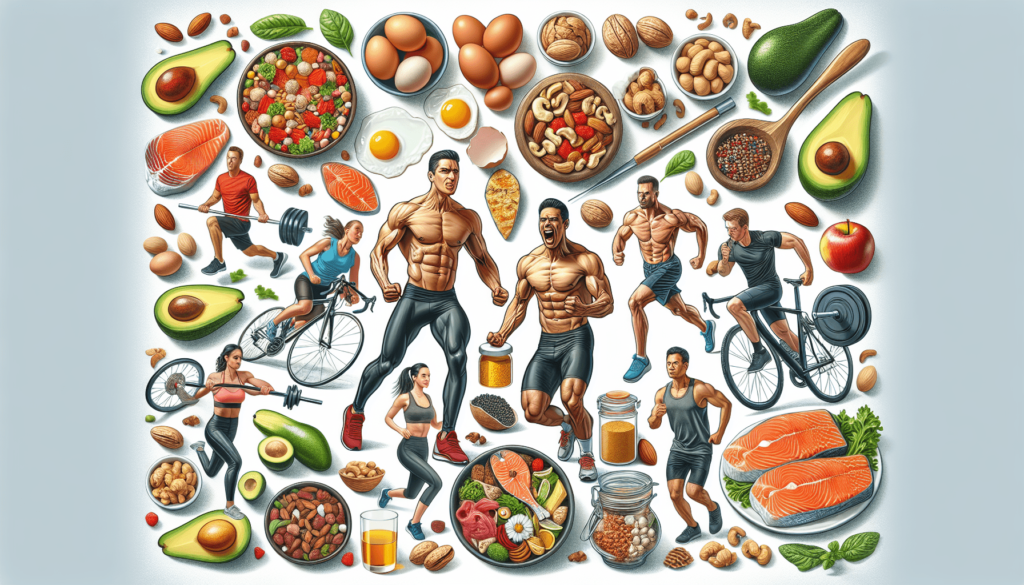You’re embarking on a journey to improve your endurance on a keto diet, and we’re here to help you every step of the way. In this article, we’ll explore the top ways to enhance your stamina and energy levels while following a ketogenic eating plan. Whether you’re an athlete looking to perform at your best or simply want to feel more energized throughout the day, these tips will provide you with the guidance you need to reach your goals. So, get ready to unlock your potential and discover the secrets to optimal endurance on a keto diet.
1. Gradually Transition to a Keto Diet
Reduce carbohydrate intake
When transitioning to a keto diet, it is important to gradually reduce your carbohydrate intake. This allows your body to adjust to using fat as its primary source of energy instead of carbohydrates. Start by gradually decreasing your carbohydrate intake over a period of time, rather than drastically cutting them out all at once. This will help minimize any potential side effects such as the “keto flu” which can occur when your body is adapting to using ketones for fuel.
Increase fat intake
As you reduce your carbohydrate intake, you need to replace those calories with healthy fats. Increasing your fat intake is essential for providing your body with a sufficient energy source on a keto diet. Opt for healthy fats such as avocados, nuts, seeds, olive oil, and coconut oil. These fats not only provide energy but also help to keep you feeling satiated and satisfied.
Monitor protein intake
While protein is an important macronutrient, it’s important to monitor your protein intake on a keto diet. Consuming too much protein can potentially kick you out of ketosis as excess protein can be converted into glucose through a process called gluconeogenesis. Aim for a moderate amount of protein, typically around 20-25% of your total daily calorie intake. This will help prevent muscle loss and provide your body with the necessary amino acids for repair and recovery.
2. Consume Sufficient Electrolytes
Importance of electrolytes on keto
Electrolytes play a crucial role in maintaining proper hydration, muscle function, and overall bodily functions. When following a keto diet, your body tends to excrete more electrolytes through increased water loss. Therefore, it is important to consume sufficient electrolytes to maintain proper balance and prevent imbalances, which can lead to muscle cramps, fatigue, and other symptoms.
Sources of electrolytes
There are various sources of electrolytes that can be incorporated into your keto diet. Foods such as avocados, spinach, nuts, and seeds are rich in essential electrolytes like magnesium, potassium, and sodium. Additionally, you can consider using sea salt or pink Himalayan salt to enhance the mineral content in your meals.
Supplementing electrolytes
In some cases, it may be necessary to supplement electrolytes to ensure you are getting an adequate amount. Electrolyte supplements can be found in powder or tablet form, making it convenient to add to your routine. Look for electrolyte supplements that contain a balanced blend of sodium, potassium, magnesium, and calcium to support your endurance and overall wellbeing.

3. Adequate Hydration
Importance of hydration on endurance
Proper hydration is essential for anyone engaged in endurance activities, and even more so on a keto diet. In a ketogenic state, your body tends to have lower water retention due to decreased glycogen stores. This makes it crucial to prioritize hydration to prevent dehydration, which can lead to decreased endurance, fatigue, and impaired overall performance.
Tips for staying hydrated on keto
To stay adequately hydrated on a keto diet, consider the following tips:
- Drink plenty of water throughout the day, aiming for at least 8-10 cups.
- Include hydrating beverages like herbal teas, infused water, and sugar-free electrolyte drinks.
- Consume water-rich foods such as cucumbers, watermelon, and leafy greens to increase your overall water intake.
- Monitor your urine color – it should be light yellow or clear, indicating proper hydration.
- Consider using a water tracking app or setting reminders to ensure you are consistently drinking enough water.
4. Fueling with Healthy Fats
Benefits of fat for endurance
Fueling with healthy fats on a keto diet offers several benefits for endurance athletes. Fat is a highly efficient fuel source as it provides a longer-lasting energy compared to carbohydrates. It helps to stabilize blood sugar levels, preventing energy crashes during extended periods of activity. Additionally, fats are necessary for proper hormone production, which is crucial for optimal endurance performance.
Good sources of healthy fats on keto
There are plenty of healthy fat sources that can be incorporated into a keto diet. Avocados, nuts (such as almonds and walnuts), seeds (such as chia and flaxseed), and fatty fish (like salmon and sardines) are all excellent choices. Including these fats in your meals and snacks will provide sustained energy and support your endurance efforts.
Pre-workout fat intake
Consuming a meal or snack rich in healthy fats before your workout can help provide a steady release of energy during prolonged exercise. Consider having a handful of almonds, a spoonful of nut butter, or a small serving of avocado before your workout. Experiment with different fat sources to find what works best for your body and helps optimize your endurance performance.

5. Utilize MCT Oil for Quick Energy
Benefits of MCT oil for endurance
Medium-chain triglycerides (MCT) oil is a type of fat that is rapidly absorbed and converted into ketones, providing a quick and easily accessible source of energy. MCT oil has been shown to enhance endurance performance by increasing fat oxidation and sparing muscle glycogen stores. It can provide an immediate boost of energy, making it an excellent choice for athletes seeking quick fuel during intense workouts or long-distance events.
How to incorporate MCT oil into your diet
To incorporate MCT oil into your diet, start by gradually adding it to your meals or beverages. Begin with a small amount, such as a teaspoon, and gradually increase the dosage as your body adjusts. MCT oil can be added to your coffee, smoothies, salad dressings, or used as a cooking oil. It is important to note that excessive consumption of MCT oil can cause digestive upset, so it’s best to start with a conservative amount and listen to your body’s response.
6. Implement Carb Cycling
Purpose of carb cycling
Carb cycling involves strategically incorporating periods of higher carbohydrate intake into your keto diet. This can be beneficial for endurance athletes as it supplies the body with glycogen stores for high-intensity workouts or competitions while still maintaining a state of ketosis. Carb cycling allows for the benefits of both fuel sources, providing quick energy from carbohydrates when needed while primarily relying on fat for fuel during lower-intensity exercises.
Timing and frequency of carb refeeds
The timing and frequency of carb refeeds will depend on individual preferences and goals. Some athletes choose to have a higher carbohydrate day once a week, while others prefer to have a carb-up meal or snack right before a demanding workout. Experimentation and monitoring your performance and ketone levels will help determine what works best for you. It’s important to note that the quality of carbohydrates consumed during these refeeds should still be prioritized, focusing on complex carbohydrates from whole foods rather than processed sources.
7. Prioritize Quality Protein
Importance of protein
Protein is a crucial macronutrient for endurance athletes as it aids in muscle repair, recovery, and growth. It also plays a vital role in supporting immune function and hormone production. When following a keto diet, it is important to prioritize quality protein sources to provide your body with the amino acids necessary for optimal endurance performance.
Choosing high-quality protein sources on keto
Opt for high-quality protein sources that are low in carbohydrates to support your keto diet. Examples include lean meats such as chicken, turkey, and fish. Eggs, Greek yogurt, and cottage cheese are also excellent options. Plant-based protein sources such as tofu, tempeh, and legumes can be included for those following a vegetarian or vegan keto diet. Aim for a variety of protein sources to ensure you are getting a complete range of essential amino acids.
8. Optimize Sleep and Recovery
Role of sleep in endurance
Getting adequate sleep is crucial for any athlete, and it becomes even more important when following a keto diet. Sleep is the time when your body repairs and recovers from the physical stress of endurance activities. Lack of sleep can impair cognitive function, decrease reaction time, and lead to decreased endurance performance. Prioritizing quality sleep will contribute to optimal endurance performance and overall wellbeing.
Tips for improving sleep quality
To optimize sleep while following a keto diet:
- Establish a consistent sleep schedule and aim for 7-9 hours of quality sleep each night.
- Create a relaxing bedtime routine to signal to your body that it’s time to wind down.
- Ensure your sleeping environment is cool, dark, and free of distractions.
- Limit exposure to electronic devices and stimulating activities in the evening.
- Avoid caffeine and stimulating substances close to bedtime.
9. Incorporate Endurance-Enhancing Supplements
Benefits of endurance supplements on keto
Certain supplements can support endurance performance on a keto diet. They provide additional support to the body during intense training sessions and help optimize overall performance. Endurance-enhancing supplements can enhance energy production, increase oxygen delivery to the muscles, and aid in recovery.
Recommended supplements for endurance athletes
Some supplements that may benefit endurance athletes on a keto diet include:
- Creatine: Helps improve strength, power, and muscle recovery.
- Beta-alanine: Enhances endurance and delays fatigue during high-intensity exercise.
- Branched-chain amino acids (BCAAs): Aid in muscle recovery and reduce muscle soreness.
- Citrulline malate: Enhances blood flow and increases endurance.
- Coenzyme Q10 (CoQ10): Supports energy production and muscle function.
It is important to consult with a healthcare professional or sports nutritionist before starting any new supplements to ensure they align with your individual needs and goals.
10. Listen to Your Body
Importance of self-awareness
On a keto diet, each individual may have unique needs and responses. It is essential to listen to your body and pay attention to how it responds to the dietary and training changes. Being self-aware and in tune with your body’s signals will allow you to make adjustments and tailor your approach to meet your specific endurance goals.
Recognizing and adjusting to individual needs
Everyone’s body is different, and what works for one person may not work for another. Pay attention to how your body feels during workouts, your energy levels, and any signs of fatigue or imbalances. Adjust your macronutrient ratios, training intensity, and recovery strategies accordingly. Experimentation and trial-and-error will help you find the optimal balance that allows you to thrive and improve your endurance on a keto diet.
By gradually transitioning to a keto diet, consuming sufficient electrolytes, staying hydrated, fueling with healthy fats, utilizing MCT oil, implementing carb cycling, prioritizing quality protein, optimizing sleep and recovery, incorporating endurance-enhancing supplements, and listening to your body, you can improve endurance on a keto diet. Keep in mind that consistency, patience, and individualization are key when it comes to achieving and maintaining optimal endurance performance while following a keto lifestyle.

